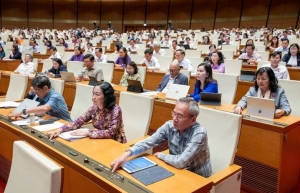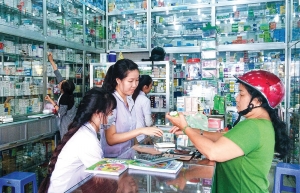Amendments mean major changes for local market
The law will promote domestic pharma production and technology transfer. This update is emphasised in Article 1.4, which introduces policies to stabilise or reduce prices for products manufactured in Vietnam through technology transfer.
 |
| Ngo Thanh Hai, lawyer, LNT & Partners |
Additionally, Article 1.5 amends Article 8 of the LoP to include investment incentives for related manufacturing projects in Vietnam. Specifically, these incentives apply to projects that have a total investment of VND3 trillion ($125 million) or more, and disburse at least VND1 trillion ($41.67 million) within three years from the date of receiving approval of the investment.
Eligible projects include research and development of technology for production or tech transfer, cultivation of medicinal plants in economically disadvantaged areas, and research to preserve and develop rare and valuable medicinal plant genetic resources. Detailed guidelines will be issued in subsequent decrees.
The amended law also has new regulations on pharmacy chains. The amended law defines and regulates chains, a concept mentioned in the LoP 2016 but previously unaddressed in detail. Pharmacy chains are now recognised as a specific type of business establishment under Article 1.12, defined as a network of pharmacies operating uniformly under the same trade name of a single organising entity.
Article 1.13 outlines the requirements for obtaining a certificate of eligibility for pharmaceutical business for chain establishments. These include suitable premises, drug storage facilities, storage equipment, transportation means, technical documents, and personnel complying with Good Distribution Practices for pharmaceuticals and raw materials.
The amended law introduces Article 17a, specifying requirements for the responsible pharmacist of a pharmacy chain establishment. These requirements are consistent with other business types (for example, import/export). It also grants pharmacy chains the right to transfer pharmaceuticals among facilities within the chain, and rotate responsible pharmacists, as stipulated in Articles 1.11 and 1.23.
Meanwhile, the new law has addition of e-commerce regulations for pharma sales. It introduces guidelines for selling via e-commerce platforms, websites, and mobile apps. Products eligible for retail through e-commerce channels include non-prescription drugs. Drugs under special control or on the restricted retail list are excluded from this provision.
Organisations engaged in e-commerce pharma sales must comply with regulations on electronic transactions and ensure the confidentiality of buyer information, provide complete and accurate information regarding their licences on their e-commerce platforms, notify the Ministry of Health or its authorised agency of their e-commerce operations, and establish online consultation and guidance services to assist buyers with proper drug usage.
The amended law legalises the rights for foreign-invested enterprises (FIEs). Previously, the rights of FIEs were outlined only in Decree No.54/2017/ND-CP. The amended law introduces a new Article 53a to provide a dedicated legal framework for these enterprises.
FIEs now are allowed to purchase back drugs produced through technology transfer initiated by the FIE itself. They may sell drugs manufactured through contract manufacturing or technology transfer arrangements in Vietnam to wholesale distributors. However, if FIEs wish to import raw materials for supply to contract manufacturers or technology transfer recipients, their licences must explicitly include the scope of importing such raw materials.
The law eliminates the vague and unclear provision in Decree 54 that stated FIEs does not perform “other acts related to drug distribution” as prescribed by law. Moreover, activities such as transportation are now explicitly excluded from the scope of drug distribution activities.
Nevertheless, the new law has a potential impact and are expected to significantly influence the industry in Vietnam. Key areas of impact include growth of pharmacy chains, encouragement of technology transfer and local manufacturing, expansion of e-commerce, logistics opportunities for FIEs, and attraction of foreign investment in local production.
The amendments facilitate and incentivise tech transfer and contract manufacturing. FIEs can now purchase and sell drugs they produce via tech transfer or contract manufacturing in Vietnam, resolving previous challenges. This change may reduce reliance on parent companies abroad.
The clear guidelines for e-commerce pharma sales present a lucrative opportunity for investors to expand operations through online platforms. With Vietnam’s rapidly growing e-commerce sector, businesses may leverage this channel to enhance profitability and reach a wider customer base. The amended law clarifies that transportation is no longer considered part of drug distribution activities. This allows FIEs to engage in drug transportation, opening the door for them to explore opportunities in logistics. However, they must ensure compliance with the relevant conditions for logistics operations should they enter this field.
 | Pharma Group expects new pharmaceutical law to open up potential Appreciative of the potential of Vietnam's pharma sector Darrell Oh, Pharma Group chairman, spoke with VIR's Nguyen Huong about some of the outstanding development and innovation in the industry. |
 | Vietnam National Assembly adopts amended Law on Pharmacy Vietnam's National Assembly adopted the amended Law on Pharmacy on the afternoon of November 21, expecting to further facility business activities. |
 | Pharma law upgrades will improve effectiveness The ratification of the law amending and supplementing several articles of the Law on Pharmacy 2016 at the end of November is significant and positive news for the healthcare sector. It is expected to address key shortcomings of the current law while incorporating best practices successfully implemented in other countries. |
 | Turning point created for pharma firms in law changes Amendments to the Law on Pharmacy are receiving strong support from the business community, expecting to create a more powerful legal system for the local market. |
What the stars mean:
★ Poor ★ ★ Promising ★★★ Good ★★★★ Very good ★★★★★ Exceptional
Related Contents
Latest News
More News
- Citi economists project robust Vietnam economic growth in 2026 (February 14, 2026 | 18:00)
- Sustaining high growth must be balanced in stable manner (February 14, 2026 | 09:00)
- From 5G to 6G: how AI is shaping Vietnam’s path to digital leadership (February 13, 2026 | 10:59)
- Cooperation must align with Vietnam’s long-term ambitions (February 13, 2026 | 09:00)
- Need-to-know aspects ahead of AI law (February 13, 2026 | 08:00)
- Legalities to early operations for Vietnam’s IFC (February 11, 2026 | 12:17)
- Foreign-language trademarks gain traction in Vietnam (February 06, 2026 | 09:26)
- Offshore structuring and the Singapore holding route (February 02, 2026 | 10:39)
- Vietnam enters new development era: Russian scholar (January 25, 2026 | 10:08)
- 14th National Party Congress marks new era, expands Vietnam’s global role: Australian scholar (January 25, 2026 | 09:54)

 Tag:
Tag:



















 Mobile Version
Mobile Version